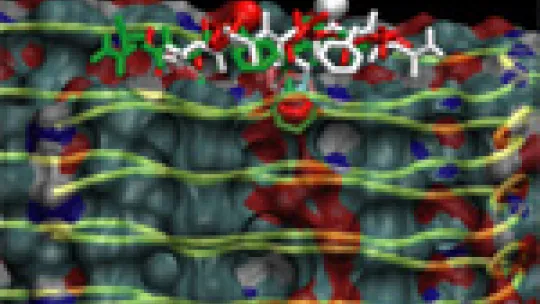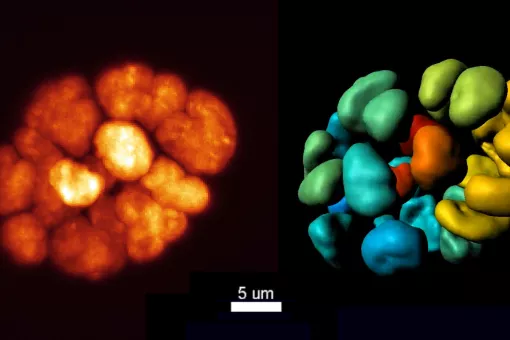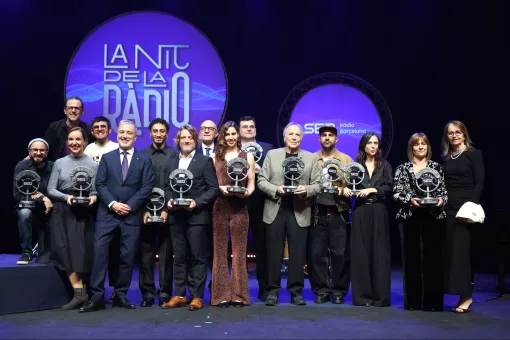Images
IRB Barcelona and the BBVA Foundation invite twenty international experts in therapeutic peptide engineering to a Barcelona BioMed Conference, which will be held in Barcelona from 26 to 28 October.
Therapeutic peptides, small proteins –less than 50 amino acids – are having a dramatic impact on the drug market. They were introduced more than 15 years ago but it has only been in the last five years that the industry has made a heavy investment in these drugs, thanks in part to the improvements in chemical synthesis techniques and a decrease in production costs. The number of peptides authorised by the U.S. Food and Drug Administration, the North American agency that approves new medicines, is increasing at an annual rate of 8% and according to studies of this sector these drugs are expected to generate a turnover of 11.5 billion Euros by 2013.
What are the advantages of these peptides? Ernest Giralt, head of the Chemistry and Molecular Pharmacology Programme at the Institute for Research in Biomedicine (IRB Barcelona) and a specialist in this field, explains that the peptides “share the best features of the so-called classical drugs (such as aspirin): they are small enough to be produce by chemical synthesis in large amounts and at low cost. In addition, they have the features of the most sophisticated molecules, such as monoclonal antibodies: they are large enough to be complex and can be directed at a specific target and, consequently, they have fewer side effects but are a thousand times more economical”. Furthermore, peptides are formed by amino acids (the same material with which cells produce proteins), thereby making them more “friendly” for the body and producing fewer allergies and rejections. Today, most peptide therapies on the market are for cancer, followed by cardiovascular diseases, metabolic disorders and infections.
Basic and applied studies in peptide engineering will be addressed in the next Barcelona BioMed Conference, organised by IRB Barcelona and the BBVA Foundation. The organisers, Ernest Giralt and Claudio Toniolo –from the University of Padua-, have invited 17 authorities in this field, experts in chemistry, biology, biophysics and materials science, to present their recent work. The conference will be held from Monday 26 to Wednesday 28 October at the Institut d’Estudis Catalans in Barcelona. Barcelona BioMed Conferences are limited to 150 participants and seek to promote interaction between experts and stimulate future collaborations.
Highlighted research at the conference
The North American Samuel I. Stupp, director of the Medical Biotechnology Institute of Northwestern University in the United States, figures among the invited speakers. Stupp works with nano-scale structures (a millionth of a millimetre) made from peptides for application in regenerative medicine. Stupp has developed nanostructures with peptides that enhance cell regeneration. These results have been published in Nature Materials (2009) and Science (2008). To date, the laboratory has succeeded in regenerating bone tissue and neurons in mice.
Ernest Giralt’s Group at IRB Barcelona studies the recognition processes behind protein-protein interactions and applies this knowledge to the development of compounds to treat diseases. His lab has devised a peptide with the capacity to bind to and break aggregations of beta amyloid protein, the plaques formed in Alzheimer’s disease. The new compound has been shown to work in lab assays, including cells cultures, and, in collaboration with the Hospital de Bellvitge de Barcelona, it is now being tested in mouse models of the disease.
Peptides are also used as vehicles for the controlled release of drugs (drug delivery). Joel Schneider, at the University of Delaware in the United States, has invented a peptidic biomaterial which is injected as a viscous gel into a wound where it rigidifies nearly on contact. This hydrogel, patented by the laboratory, has wide range of potential applications, from the controlled release of antibiotics to cure an open wound or to prevent infection, to the delivering a targeted payload of cells to repair damaged tissue.
Shiron Futaki, at the University of Kyoto in Japan, is an international authority on cell-penetrating peptides. Futaki has discovered a family of peptides that serve as delivery vehicles to the cytoplasm and cell nucleus. The future of these transport mechanisms is huge. Giralt goes on to explain that “until now, promising molecules that act against intracellular proteins have been discarded because they cannot cross the membrane”. Although no drug based on this transport system is available yet, several clinical trials are underway to test drugs against cancer that use Futaki’s delivery vehicles.
About IRB Barcelona
The Institute for Research in Biomedicine (IRB Barcelona) pursues a society free of disease. To this end, it conducts multidisciplinary research of excellence to cure cancer and other diseases linked to ageing. It establishes technology transfer agreements with the pharmaceutical industry and major hospitals to bring research results closer to society, and organises a range of science outreach activities to engage the public in an open dialogue. IRB Barcelona is an international centre that hosts 400 researchers and more than 30 nationalities. Recognised as a Severo Ochoa Centre of Excellence since 2011, IRB Barcelona is a CERCA centre and member of the Barcelona Institute of Science and Technology (BIST).





